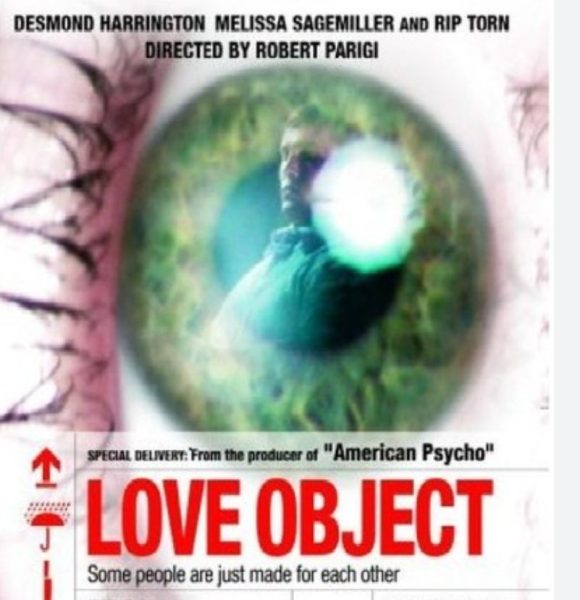THE 20TH ANNIVERSARY OF “LOVE OBJECT”:
AN INTERVIEW WITH WRITER-DIRECTOR ROBERT PARIGI
by
Tom Lavagnino
The January 2023 death of Edward R. Pressman, legendary producer of such films as BADLANDS, CONAN THE BARBARIAN, and WALL STREET, heralded an untimely end to one of the most award-winning careers in Hollywood history.
But what many ScareTube fans might not realize is that Pressman’s horror bonafides were equally significant. AMERICAN PSYCHO, a half-dozen iterations of THE CROW, and Brian DePalma’s SISTERS (not to mention PHANTOM OF THE PARADISE) pepper his long and distinguished resume.
And one of Pressman’s most remarkable horror-centric productions is the vividly-realized 2003 feature film LOVE OBJECT. Written and directed by Robert Parigi (who describes his movie as “THE TENANT plus chainsaws”), it showcases an aesthetic that manhandles the bland arena of THE OFFICE, marries it to the “Real Doll” phenomenon, and twists it into a veritable pretzel of psychological horror that touches upon themes of sexual violence, body imaging, and social isolation; its deft, incendiary touch remains catnip for fans of similar mind-bending classics like VERTIGO and David Cronenberg’s DEAD RINGERS.
The plot of LOVE OBJECT centers upon Kenneth Winslow (played with feral economy by DEXTER star Desmond Harrington), a corporate drone who, while accomplished at his job (producing neurasthenic “how-to” instructional guides), is provided an assistant: newbie-to-the-office Lisa Bellmer (the terrific Melissa Sagemiller, star of SLEEPER CELL and LAW & ORDER: SVU). Sparks fly.
But back home at his bachelor apartment, Kenneth’s relationship with recently-acquired silicon sex doll “Nikki”–as lifelike as can be–takes on a suddenly-volatile mode, raising dramatic (and horrific) stakes. As Kenneth’s burgeoning relationship with Lisa escalates, does Nikki become “jealous”? Does Kenneth actively “substitute” Nikki for Lisa? (Or vice versa?) Is Kenneth dominant in his own thoughts and emotions, or has a “love object” of one kind or another (in his mind, in his personal life, or in society-at-large?) taken control?
With its entertaining combo of horror, socio-political commentary, and dynamite casting (both LARRY SANDERS-era Rip Torn and (wonderfully-Udo-Kierish) Udo Kier also star), LOVE OBJECT is a delight for genre fans, a must-see that ranks it as a classic of psychological horror.
On the occasion of the film’s twentieth anniversary, ScareTube sat down with writer-director Parigi to suss out the relevance of LOVE OBJECT to the workplace (and beyond!), reflect on the greatness of this independent film’s allure, and dive into other matters of creative import (ChatGPT, anyone?).
SCARETUBE: One of the things that strikes me about LOVE OBJECT is that Kenneth’s job is to create instructional manuals that are bland and functional, by design. And it’s suggested that he, more than certainly anybody else in the story, would benefit from a similar “how-to” manual for sex, given his lack of social and sexual experience.
ROBERT PARIGI: Well, nature abhors a vacuum. And the Marquis de Sade said that innocence is a kind of vacuum that invites violation.
SCARETUBE: Kenneth even says, at one point, “everything’s easy if you just read the instructions.”
ROBERT PARIGI: But, of course, he’s wrong. Because in life there are no instructions. I also wanted that kind of Kafka-esque feeling of a job that’s utterly pointless. I mean, you’re writing all these manuals and no one even reads them, but you’ve got to have them. And there’s some lawyer someplace who says you have to have them, so there’s someone who has to write them. And it ultimately gets to the idea that, look, the most important things in life don’t have instruction manuals.
SCARETUBE: Although LOVE OBJECT was made 20 years ago, it seems eerily prescient. The workplace sexual harassment issues that it deals with, as well as the alienation of Kenneth’s character, who’s kind of like what you would now call an incel. That term didn’t even exist, I don’t think, 20 years ago.
ROBERT PARIGI: I don’t really consider him an incel because he doesn’t have that much self-awareness. As I understand an incel, it’s a person who’s really angry because they can’t get laid. Obviously, at the beginning of the movie, Kenneth isn’t getting any. But he’s so lacking in self-awareness, he doesn’t even perceive that as a loss or as pain. And there’s this idea of, “what is the consequence of repression”? And in the case of Kenneth, it’s so repressed. And he is so alienated from it, and so unaware of sexuality, that once that door starts to open, he has no tools to deal with it. And of course he goes off the rails.
SCARETUBE: Exactly.
ROBERT PARIGI: Which of course loops back into the whole thing with the HR department. And this is why I say Kenneth is the exact opposite (of an incel). He is the ideal corporate drone worker based on today’s demands. Because prior to everything that happens in the movie, all he does is go to work. Do his job, go home, overperform, overdeliver. And I guarantee you, if you went to Kenneth’s HR file (prior to the movie’s story), there is not a single (negative) thing. No harassment complaints or off-color remarks or jokes or anything like that. Because he is a total drone. He has, in effect, one-hundred-percent complied with the requirements of modern corporate culture. And when that happens, does that create a better person, or a worse person, or something inhuman?
SCARETUBE: That’s a great question. And a great point. Maybe Kenneth isn’t an incel, just extremely isolated.
ROBERT PARIGI: (That is) another theme of the movie, and I think this is kind of like in real life, people go crazy when they’re isolated. Look, I’m a horror movie nut. I’ve always had weird tastes. I’ve always been an outsider of one kind or another. So, in a way, it took me a while to admit that fact. But if you want, or need proof, that isolation drives people crazy? All you have to do is look at behaviors during the lockdown.
SCARETUBE: True. And, you know, that’s interesting because it didn’t occur to me until you said that, but LOVE OBJECT kind of is a lockdown kind of movie in that way.
ROBER PARIGI: It’s what I call a “weird apartment movie,” which kind of became our life during lockdown. I think really one of the major reasons Kenneth goes nuts is this isolation that he has. I mean, you look at someone like Ed Gein. Again, someone who’s totally isolated. (And) it just sort of snowballs from there. And that’s what’s very interesting about our current moment, how heavily people are invested in virtual reality of different kinds. Social media, for example, is a virtual reality. (Users) have this illusion of being connected to the world, but they’re not, they’re just more and more isolated. And I wonder if it’s driving society collectively insane.
SCARETUBE: Of course, the lynchpin of LOVE OBJECT is “Nikki,” the “realistic, full-sized love doll” that Kenneth acquires, and he’s got some pretty conflicted views of his relationship with it, and how it correlates to his relationship with Lisa. There’s even a line where Kenneth says, “just because she’s not alive doesn’t mean she isn’t real.”
ROBERT PARIGI: That’s the crux of the movie. For example, in terms of our own experience of the world or in our own feelings, (that’s) kind of a real dilemma that we have. “If you feel something, is it real?”
SCARETUBE: It must be real, right?
ROBERT PARIGI: Well, I don’t know. For example, the feeling is real. (But) what about love? If you’re in love with someone, what if they’re not in love with you? What’s the status of that feeling? Is it necessary for that to be reciprocated for it to be real? Just because Kenneth feels something doesn’t mean it’s real. But, on the other hand, (he) doesn’t have any choice. All we have are our own perceptions.
SCARETUBE: The “body horror” component of LOVE OBJECT, too, is quite powerful and resonant.
ROBERT PARIGI: The issue of embodiment is absolutely central to being human. I mean, this is why AI will never be able to meaningfully create. Now, it can follow formulas. It can mix pre-existing flavors together. But it won’t be able to write anything new. It’s just going to create imagery that’s derived from other imagery. It can make wallpaper, background music, page-filler, but it can’t innovate. There’s been a lot of talk now about the perceived threat of AI to creativity, but one thing people don’t remember is going all the way back to the early days of electronic music, Raymond Scott had made a kind of automatic music generator. And the idea is that this synthesizer, his description of it is that it was a guided missile of music. You would just get on, fire this guided missile, and it would go places. And the idea from Raymond Scott’s perspective was never that it was a finished work that you could use. It was just, “oh, that’s a catchy riff, I’ll take that.”
SCARETUBE: It’s more like a prompt than anything else.
ROBERT PARIGI: Yeah, I don’t know how it’s going to get out of being a prompt without actually having a body. And in addition to that body having the limitations of a body. And of course the other big problem that you have with AI is there’s just one, so Chat-GPT is just one program, right? So do you want to hang out with just one friend the rest of your life? You know, do you want to just read stories by one person the rest of your life? The insatiable drive for novelty, just simple novelty, I think means that there’s going to have to be something else.
SCARETUBE: I hope you’re right. And I think it’s tantamount to being a criminal act that a thoroughly amazing, human-made creation like LOVE OBJECT hasn’t received the exposure and acclaim it deserves. Given the renewed technology and sophistication associated with “making human-like robots,” sex-based or otherwise, have you ever entertained the idea of redoing it in that realm?
ROBERT PARIGI: There are two answers to that question. First of all, I’ve always loved this trope that we have in the post-ALIEN world, where there’s always some character that says, “wait, don’t kill it, save it for the weapons division!”
SCARETUBE: Right, right!
ROBERT PARIGI: So during lockdown I wrote this script “seXXXdroid” about a shape-shifting sex-robot run amuck, just so I could have a character say, “don’t kill it! Save it for the Leisure Division!” But if I was doing a sequel to LOVE OBJECT I would explore the weird world of ritual sex magic instead of anything technological. Who are all those people with the purple stain? Depraved minds want to know.
SCARETUBE: Last question: All of the actors in LOVE OBJECT are terrific, but what was it like working with a genuine legend like Udo Kier?
ROBERT PARIGI: Udo is tremendous. Any time you ever have a chance to cast Udo, do it. Those will be incredible scenes, and those will be great shooting days. And I remember, I had asked him to autograph a still I had from FLESH FOR FRANKENSTEIN (Paul Morrisey’s classic 1973 horror movie, wherein Kier played “Baron von Frankenstein”), and I asked him to autograph it with his famous quote “in order to know life, one must first fuck death in the gallbladder,” and he was very, sort of like, “oh, no, I cannot write that! I cannot write that!” So he wrote something very nice instead.
NOTE: LOVE OBJECT is currently unavailable on conventional streaming services (a situation which will hopefully be remedied in the near future); in the meantime, check out the DVD (complete with a fascinating “director’s commentary” from Robert Parigi, as well as some addendum extras) on Amazon.
– Tom Lavagnino is a playwright, television producer and golfer (18 handicap) living in Southern California. www.tomlavagnino.com







